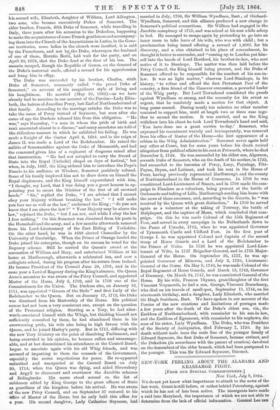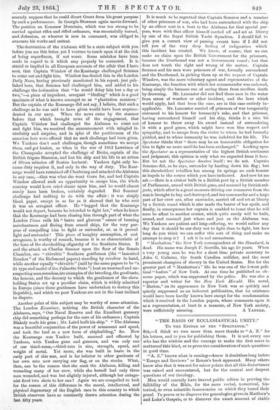NEW-YORK FEELING ABOUT THE ALABAMA AND REARSARGE FIGHT.
[FROM OUR SPECIAL CORRESPONDENT.]
New York, July 9, 1864. WE do not yet know what importance to attach to the news of the last week. Grant is still before, or rather behind Petersburg, against which he has not of late been active. The insurgents have made a raid into Maryland, the importance of which we are not able to determine from the lack of official information. General Lee can )1
scarcely suppose that he could divert Grant from his great purpose by such a performance. In Georgia Sherman again moves forward. The position on Kenesaw Mountain, which was too strong to be carried against rifles and rifled ordnance, was successfully turned, and Johnston, or whoever is now in command, was obliged to evacuate his works and retreat.
The destinetion Of the Alabama will be a stale subject with you before you see this letter, yet I venture to touch upon it at the risk of being Superffitoni, if not worse. Some mistakes have been made in regard to it Which may properly be corrected. It is stated or implied in all European accounts of the affair that I haVe semi, that Captain Whialmi of the Kearsarge challenged Sentinels to come out and fight him. Winslow has denied this in the London Daily NewS, having previously mentioned in his report, just pub- lished here, that. Seinches had challenged him, and added to his Challenge the intimation that "he would delay hint but a day or two,"-'—a piece of impudent, arrogant "bluffing" which is a good specimen of what is known amongst us as "plantation Manner:S." But the captain of the Kearsarge did not say, I beliae, that such challenge as he was said to have given would have been unprece- dented in our navy. When the news came by the steamer before that which brought news of the engagement, that Captain Winalow had challenged the Alabama to comb out and fight him, we received the announcement with Mingled in- credulity and eurprise, and in spite of the positiveness of the assertion bets were offered that no such challenge had been giien. We 'Yankees don't send challenges, though sometimes we accept them, and get beaten, as When in the war of 1812 Lawrence of the Chesapeake accepted the challenge of Broke, captain Of the British frigate Shatnion, and lost his ship and his life in an action of fifteen minutes off Boston harbour. Yankees fight only be- Cause duty requires it, and only in the way of ditty. The Kea- Sage would have remained Off Chetbottrg and attacked theAlabiluia in any ease,--41iiit WAS what she Went there for, and had Captain Winslow allowed such an opportunity to escape him, the whole country would have cried Shame upon him, and he would almost surely have been broken, certainly degraded. Silt Seinisies' challenge had nothing to do with the affair : it was simply blank papa, except in so far as it showed that he who sent it was an arrogant officer. He "begged that the Kea:Marge would not depart, because he intended to fight her," when he kiie* that the Kearsarge had been 'chasing hitt through part of what the London Times calls his " brate and glorious " career of burning merchantmen and fleeing froth armed ships, for the very pur- pose of compelling him to fight or surrender, or, as it proied fight and surrender ! This piece of haughty assumption, of cool arrogance, is worthy of remark, because it is so Characteristie of the tone of the slaveholciing oligarchy of the Southern States. It and the attack on Charles Sumner upon the floor of the Senate Chamber, one " chivakia " Southern gentleman (the "lamented Brookes" of the Richmond papers) standing by revolver in hand, while another equally "chivalric" (said by the same papers to be "a fit type and model of the Palmetto State ") beat an unarmed and un- suspecting man senseless,are examples of the breeding, the good taste, the honour, and the decency to which the gentlemen of the slave. holding States set up a peculiar claim, Which is widely admitted in Europe (since those gentlemen have Undertaken to destroy this Republic), and which we poor Yankees are not in the least inclined to dispute.
Another point of this subject may be worthy of some attention. The London Examiner, noticing the British character of the Alabama, says, " Our Naval Reserve and the Excellent gunnery ship did something perhaps for the care of his ordnance ; Captain Blakely made his guns ; .Mr. Laird built his ship." " The Alabama was a beautiful conjunction of the power of armament and speed, and took the lead as a new form of shipbuilding," &c. Now the Kearsarge was Yankee built, manned and officered by Yankees, with Yankee guns and gunners, and was only one of our third-rates,—third-rate in size, strength; speed; and weight of metal. Yet more, she was built in haste in the early part of this war, and is far inferior to other gunboats of her own rate now carrying our flag, or on the stocks. What, then, can be the reason that she sunk the Alabama, killing and wounding many of her crew, while she herself had only three men wounded, and was . but slightly injured, although her antago- nist fired two shots to her one? Again we are compelled to look for the reason of this difference in the moral, intellectual, and physical degeneracy of the English race in this country to which British observers have so constantly drawn attention during the last fifty years.
It is much to be regretted that Captain Semmes and a number of other prisoners of war, who had been surrendered with the ship by an officer sent in a boat to the Alabama for that special pur- pose, were with that officer himself carried off and set at liberty by one of the Royal British Yacht Squadron. I should fail to give you a correct view of passing events hero if I did not tell you of the very deep feeling of indignation which this incident has created. We know, of course, that we can make no claim upon the British 'Government for the prisoners, because the Deerhound was not a Government vessel ; but that does not touch the right and wrong of the matter. Captain Semmes and his men were prisoners of war, formally surrendered and the Deerhound, in picking them up at the request of Captain Winslow, was the mere voluntary agent and representative of the Kearsarge, the function with which her commmander was endowed, being simply the humane one of saving them from needless death by drowning. Mr. Lancaster did not find those men in the water from stress of weather or other incident, and the laws which would apply, had that been the case, are in this case entirely in- applicable. Mr. Lancaster carried off prisoners of war temporarily entrusted to his honour for humanity's sake, and that prisoner, having surrendered himself and his ship, thinks it a nice bit of honour to throw away his sword instead of surrendering it with a good grace, which might have won him respect and sympathy, and to escape from the victor to whom he had formally yielded, and to whose humanity he was indebted for his life. The Spectator thinks that " there may be an honourable obligation for him to fight no more until be has been exchanged." Looking upon the Spectator as a representative of the highest British sentiment and judgnient; this opinion is only what we expected from it here. Silt let not the Spectator deceive itself : we do not. Captain Semmes did, as he says, surrender by hauling down his flag ; but this alaveholders' rebellion has among its springs no such honour as impels to the course which you have indicated. And now let me ask :—Here is a cruiser built in a British port by a British member of Parliament, armed with British guns, and manned by British sub- jects, which after in a great measure driving our commerce from the seas is brought to bay and destroyed, and her commander and a large part of her crew are, after surrender, carried off and set at liberty by a British vessel which is also made the beater of her spoils, and finally, in consequence her captain is enabled to boast that he will soon be afloat in another cruiser, which quite surely will .be built, armed, and manned just where and just as the Alabama was. We Yankees are patient and long-suffering, we would rather any day that it should be our duty not to fight than to fight, but how long do you think we can suffer this sort of thing and make no attempt to stop it ? I ask it in sad earnestness.
" Manhattan," the New York correspondent of the Standard, is dead. His name was Joseph F. Scoville, his age 50 years. When a very young man he was for a short time private secretary to John C. Calhoun, the South Carolina nullifier, and the most prominent champion of slavery in the United States. But for the greater part of " Manhattan's'' life he was one of the lowest poli- tical " loafers " of New York. At one time he published an ob- scene paper, which was suppressed by the police. He was also a reporter and writer for the New York lie, ald. His novel, " Marion," on its appearance in New York was so quickly and quietly suppressed as an indecent publication, that its existence would have been hardly known here except for the condemnation which it received in the London papers, whose comments upon it as a representation, at least in a measure, of New York society,































 Previous page
Previous page